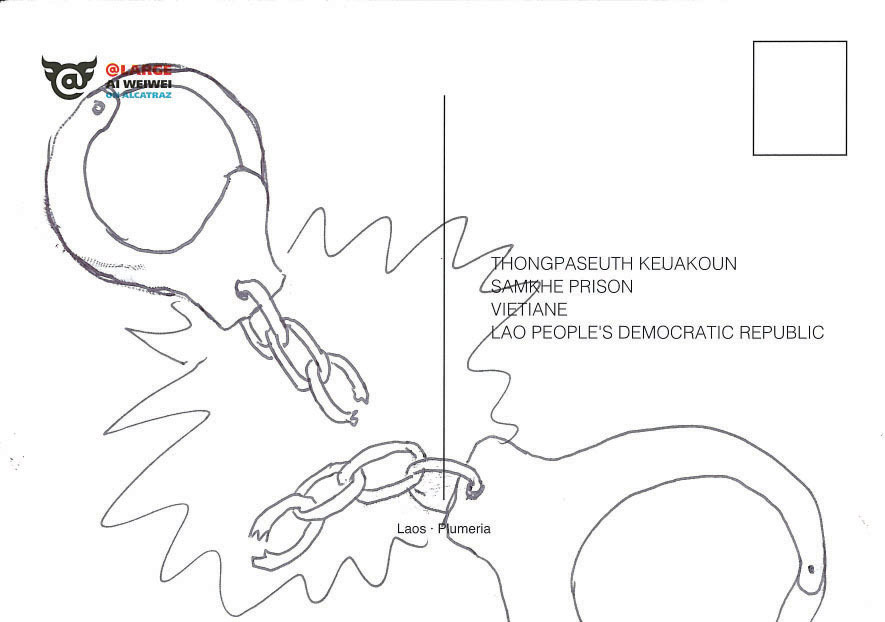Ai Weiwei explores the political power of letter writing
- Text by Miss Rosen
- Photography by From Ai Weiwei: Yours Truly, published by Chronicle Books 2018

Ai Weiwei was born in 1957 – the same year that China declared his father, celebrated poet Ai Qing, an enemy of the state for advocating for free speech. For the next two decades, the family lived in labour camps. As political prisoners, their confinement was designed to break them – yet they persevered.
“Ai Weiwei recalls his father receiving an anonymous postcard – unsigned to ensure the sender’s safety – commemorating the publication of Ai Qing’s most famous poem. His father took great solace in the card, and Ai Weiwei never forgot it,” says David Spalding, editor of Ai Weiwei: Yours Truly – Art, Human Rights, and the Power of Writing a Letter (Chronicle).
The book brings together the magnificent undertaking that was @Large: Ai Weiwei on Alcatraz (2014-15), a massive art installation that drew 900,000 over seven months. Within the show, Ai created a space for visitors to write postcards to political prisoners around the globe. The book spotlights five prisoners, including Chelsea Manning, to reflect on the ways in postcards informed their lives.

“I interviewed Chelsea Manning in 2015, while she was still incarcerated at Fort Leavenworth,” Spalding reveals. “I was particularly interested in trying to understand at what point Chelsea’s sense of injustice overshadowed her need for personal freedom. Such fundamental questions recur throughout the book – questions that I think are now more pressing than ever.”
“Chelsea’s responses were generous and forthcoming, and her fortitude is inspiring. I think many visitors to Alcatraz wrote to Chelsea because they were already familiar with her case and believe that her actions are defensible. Here was an American being held in deplorable conditions – while serving a draconian sentence – for revealing information about what the US government was doing in Iraq. Many people share Chelsea’s desire for greater government transparency and accountability, and wanted to let her know.”

The book includes four pre-addressed, tear-out postcards so that readers can participate, and experience the small but transformational power of interpersonal communication. “In our digital age, there is something deeply personal about both the writing and the receipt of a postcard – a tangible, tactile message inscribed and delivered by hand and read by following the loops and strokes of someone hoping to be legible,” Spalding says. “A postcard cannot be simply deleted; it is lasting proof that someone cares.”
“The prisoners of conscience featured in Yours Truly – both those in the exhibition and in the book – are individuals from around the world who have been imprisoned for the peaceful expression of their beliefs or identity, though they have neither used nor advocated violence. They were vetted by Amnesty International, which also advised on which prisoners could safely receive postcards, given the conditions of their incarceration.”
“There are journalists who dared to report on governmental corruption; civil rights attorneys who merely tried to uphold the rule of law in the defence of disenfranchised clients; protesters calling for an end to extra-judicial killings, to name just a few. Each of the prisoners featured in the project is a case study in bravery.”


Ai Weiwei and Chelsea Manning

Alcatraz Island
Ai Weiwei: Yours Truly – Art, Human Rights, and the Power of Writing a Letter is available now from Chronicle.
Follow Miss Rosen on Twitter.
Enjoyed this article? Like Huck on Facebook or follow us on Twitter.
You might like

A reading of the names of children killed in Gaza lasts over 18 hours
Choose Love — The vigil was held outside of the UK’s Houses of Parliament, with the likes of Steve Coogan, Chris O’Dowd, Nadhia Sawalha and Misan Harriman taking part.
Written by: Isaac Muk

Youth violence’s rise is deeply concerning, but mass hysteria doesn’t help
Safe — On Knife Crime Awareness Week, writer, podcaster and youth worker Ciaran Thapar reflects on the presence of violent content online, growing awareness about the need for action, and the two decades since Saul Dibb’s Bullet Boy.
Written by: Ciaran Thapar

The UK is now second-worst country for LGBTQ+ rights in western Europe
Rainbow regression — It’s according to new rankings in the 2025 Rainbow Europe Map and Index, which saw the country plummet to 45th out of 49 surveyed nations for laws relating to the recognition of gender identity.
Written by: Ella Glossop

Meet the trans-led hairdressers providing London with gender-affirming trims
Open Out — Since being founded in 2011, the Hoxton salon has become a crucial space the city’s LGBTQ+ community. Hannah Bentley caught up with co-founder Greygory Vass to hear about its growth, breaking down barbering binaries, and the recent Supreme Court ruling.
Written by: Hannah Bentley

Bernie Sanders introduces Clairo at Coachella, urging young Americans to “stand up for justice”
Coachella charmed — The Vermont Senator praised the singer-songwriter for her efforts in raising awareness of women’s rights issues and Gaza.
Written by: Isaac Muk

Plestia Alaqad: “Journalists should focus on humanising people”
Huck’s April interview — Having become one of the most crucial and followed voices from inside Gaza in the aftermath of October 7, the award-winning author and journalist is releasing a new memoir, ‘The Eyes of Gaza’, collating diary entries made over the past 18 months. We caught up with her to hear more about it.
Written by: Isaac Muk